A Journey Through Time and Culture
Welcome to Africa.com’s spotlight feature on the Museums of Nigeria, an extraordinary collection of cultural institutions that preserve, celebrate, and display the rich tapestry of Nigeria’s history and diverse communities. From the coastal landscapes of Lagos to the historical city of Jos, Nigeria’s museums serve as a beacon of enlightenment and unity, connecting past, present, and future.
The Multifaceted Story
Nigeria is not just a country; it’s a compilation of many stories, languages, and traditions, woven together to create a vivid cultural mosaic. Its museums capture this essence, displaying everything from ancient Nok terracotta to the artifacts of the Nigerian Civil War, and from the royal regalia of Yoruba kings to modern Nigerian art.
Types of Museums
Historical Museums: Dig deep into Nigeria’s colonial past, traditional kingdoms, and important historical milestones.
Art Museums: Celebrate the innovation and creativity of Nigerian artists, both historical and contemporary.
Cultural Centers: Explore the customs, crafts, and folklore of Nigeria’s diverse ethnic groups.
Science & Natural History: Discover Nigeria’s natural wonders, from its rich biodiversity to its geological marvels.
Featured Museums
- National Museum, Lagos: A cornerstone of Nigerian culture, housing an impressive collection of art and historical artifacts.
- Jos Museum: Known for its pottery collection and an adjacent zoo, this museum provides a well-rounded understanding of Nigeria’s central plateau region.
- Nike Art Gallery, Lagos: One of the largest of its kind in West Africa, this museum offers an expansive collection of contemporary Nigerian art.
- Owo Museum, Ondo State: Here you can discover the rich history and culture of the Yoruba people, one of Nigeria’s major ethnic groups.
Beyond the Exhibits
Voices of Nigeria: Each museum serves as a forum where the voices of local communities are amplified. Hear firsthand accounts, delve into oral histories, and engage with interactive exhibits that bring the culture to life.
Educational Programs: Many of Nigeria’s museums offer workshops, lectures, and guided tours aimed at educating the public on various aspects of Nigerian heritage.
Why Explore Nigerian Museums?
Through the museums of Nigeria, one gains an invaluable understanding of the soul of this great nation. These museums don’t just tell stories; they invite you to become a part of them. Whether you’re a history buff, an art lover, or someone interested in understanding the many layers of Nigerian society, these museums offer a window into the heart of Nigeria.
National Museum, Lagos
The National Museum in Lagos is one of the most important cultural institutions in Nigeria, founded in 1957. It has a rich collection of Nigerian art, including statuary, carvings, archaeological, and ethnographic exhibits. Among its most valued collections is the terracotta human head known as the Nok, which dates back to 500 B.C.
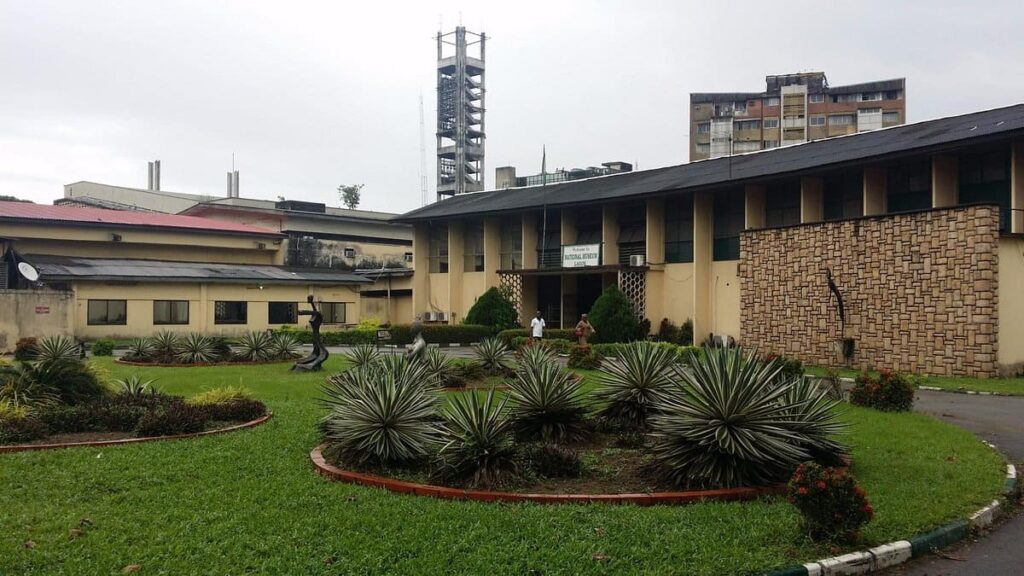
This is one of the most prominent museums in Nigeria, located in the heart of Lagos. The museum houses a wealth of artifacts, ranging from traditional art pieces to historical items like the car in which Murtala Ramat Muhammed, a former Head of State, was assassinated. Special collections highlight Nigeria’s rich history, including its colonial past, ancient civilizations, and indigenous arts and crafts.
Besides traditional Nigerian art, the museum is also known for its contemporary art collection. It serves as a hub for scholars and art enthusiasts, aiming to promote the understanding and appreciation of Nigeria’s rich heritage.
Address: Awolowo Road, Lagos Island, Lagos
Phone Number: +234 1 263 5578
Jos Museum
Located in the serene city of Jos, Plateau State, Jos Museum was founded in 1952. The museum is famous for its pottery collection and has an adjacent Pottery Hall, added in 1992. This museum also provides significant insights into the prehistoric culture of Nigeria, including the famous Nok culture, which is one of the earliest African cultures.
The museum complex also houses the Museum of Traditional Nigerian Architecture, with life-size replicas of types of buildings from different regions of Nigeria. This feature makes it a holistic educational center where visitors can learn about Nigerian architecture alongside its art and history.
Address: Yakubu Gowon Way, Jos, Plateau State
Aso Rock Presidential Villa Museum, Abuja
The Aso Rock Presidential Villa Museum in Abuja offers a unique experience as it is situated within the Nigerian Presidential Complex. The museum aims to provide visitors with a deep understanding of Nigeria’s political history.
It houses various presidential artifacts and memorabilia, offering a detailed look at the life and times of Nigeria’s presidents. It also serves to educate the public about the political history of the nation, complete with important documents and photographs.
Address: Yakubu Gowon Crescent, The Three Arms Zone, Asokoro, Abuja
Nike Art Gallery, Lagos
This is a gem for contemporary African art lovers. Located in Lagos, the Nike Art Gallery is considered one of the largest in West Africa. Owned by Nike Davies-Okundaye, the Nike Art Gallery is more than just a museum; it’s an art gallery, a textile and art workshop, and a cultural center all rolled into one. With over 8,000 artworks, this gallery is considered one of the largest in West Africa.
The gallery promotes Nigerian culture through art, offering a wide range of activities such as art exhibitions, workshops, and cultural days. From traditional to contemporary Nigerian art, visitors are given a chance to explore Nigeria’s artistic history in depth. It’s not just a museum but also a cultural and educational center.
Address: No. 2, Elegushi Road, 3rd Roundabout, Lekki Phase 1, Lagos
Phone Number: +234 1 270 5964
Benin City National Museum
Located in Benin City, Edo State, this museum holds a significant collection of artifacts related to the Benin Empire, one of the oldest and most highly developed states in the coastal hinterland of West Africa. The museum is renowned for its bronze artifacts and ivory carvings, which are significant to the cultural heritage of the Benin people. It also displays ancestral altars from the kingdom, which was one of the most advanced and organized societies in ancient Sub-Saharan Africa.
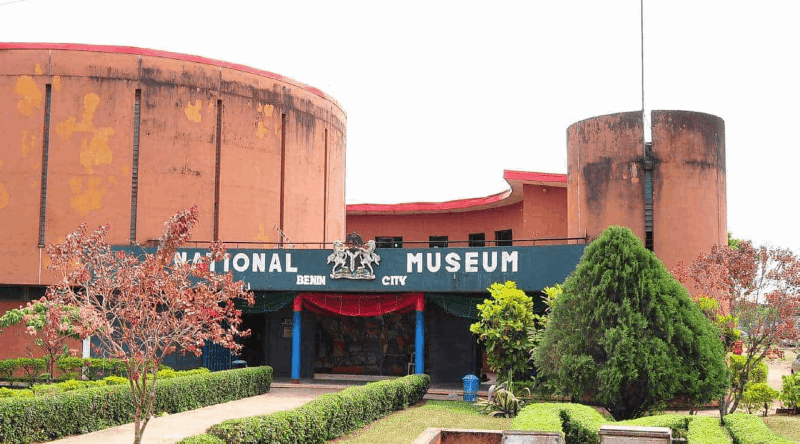
The museum also delves into the history of colonialism in the region, offering a comprehensive view of how the Kingdom of Benin met, interacted with, and eventually fell to colonial powers. It serves as a poignant reminder of the richness of African civilizations and the complexities of their histories.
Address: King’s Square, Ring Road, Benin City, Edo State
Esiẹ Museum
Nestled in the heart of Esiẹ, a town in Kwara State, the Esiẹ Museum stands as one of Nigeria’s oldest museums, founded in 1945. The museum is famous for housing an extensive collection of over one thousand soapstone images believed to represent the community’s ancestors. These remarkable sculptures range from small figurines to life-sized forms and are said to have mysterious origins, adding a layer of intrigue and mystique to the museum. The Esiẹ Museum not only serves as a cultural and historical hub but also as a place of research and learning, offering a rare glimpse into the intricate spiritual and social fabric of the Yoruba people.
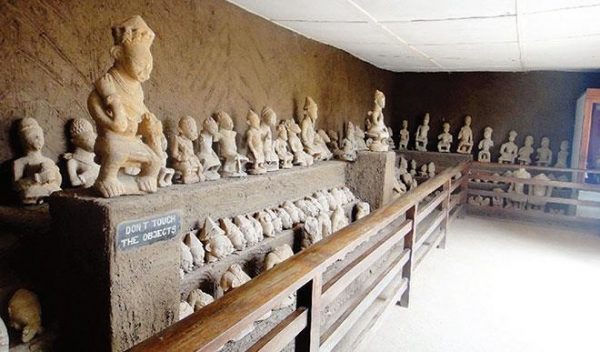
Moreover, the Esiẹ Museum plays a vital role in the preservation of local traditions and history. It has become a gathering place for scholars, students, and tourists interested in Nigerian culture. Over the years, the museum has expanded its collections to include artifacts from different periods of Nigerian history, as well as exhibits focusing on contemporary art and crafts. It’s a must-visit destination for anyone eager to delve into Nigeria’s rich cultural heritage and is often included in educational curricula to foster a sense of identity and historical consciousness among young Nigerians.
Address:
Esiẹ Museum
Esiẹ, Irepodun LGA, Kwara State, Nigeria
Yemisi Shyllon Museum of Art
Located within the Pan-Atlantic University campus in Lagos, the Yemisi Shyllon Museum of Art is an extraordinary institution that serves as a bridge between Nigeria’s artistic past and its innovative future. The museum houses an eclectic collection that spans traditional African art, modern and contemporary Nigerian art, and even includes international pieces. With its extensive range of exhibits, the museum aims to foster a greater understanding of Nigerian culture while also pushing boundaries to inspire a new generation of artists and art enthusiasts.
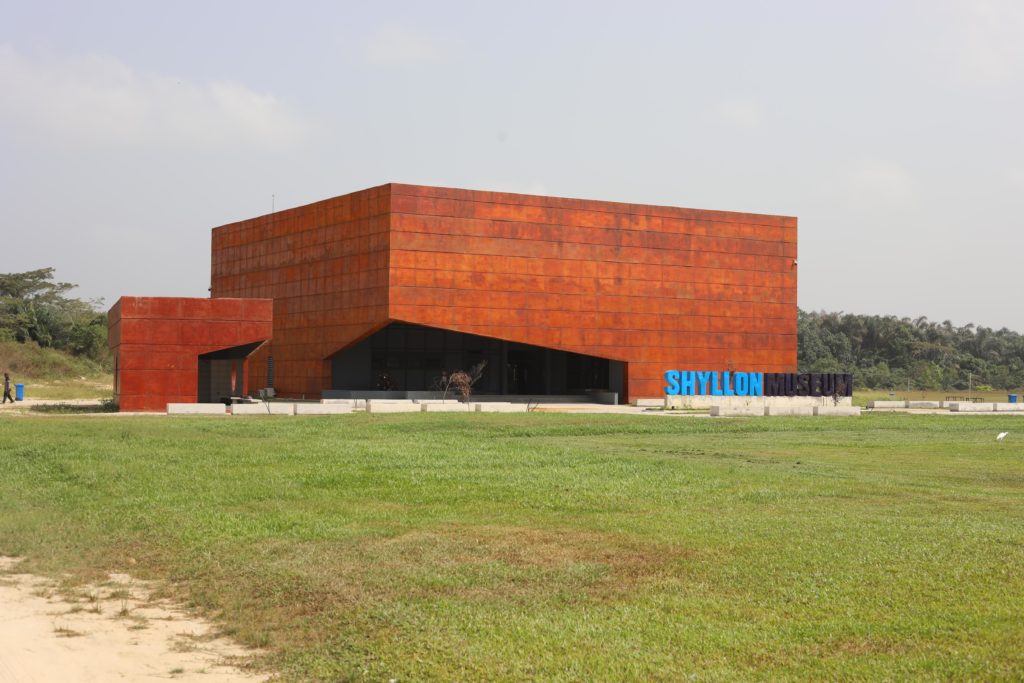
The museum was established through a collaboration between the Pan-Atlantic University and Prince Yemisi Shyllon, one of Nigeria’s leading art collectors, and aims to serve educational and cultural purposes. It offers a unique platform for dialogue, exploration, and inspiration, featuring artworks that challenge conventional notions of art and culture. Whether you’re an art aficionado or a casual visitor, the Yemisi Shyllon Museum of Art offers a captivating experience that resonates on many levels.
Address:
Pan-Atlantic University, Km 52 Lekki-Epe Expressway, Ibeju-Lekki, Lagos, Nigeria
National Museum of Unity
Nestled in the bustling city of Ibadan, the National Museum of Unity is an emblem of Nigeria’s diverse cultures, languages, and traditions. With an aim to foster unity and promote understanding among Nigeria’s many ethnic groups, the museum houses an extensive collection that ranges from historical artifacts and archaeological finds to traditional art pieces and crafts. Each exhibit is a tribute to the rich cultural mosaic that makes up Nigeria, offering visitors a comprehensive overview of the country’s historical journey and vibrant communities.
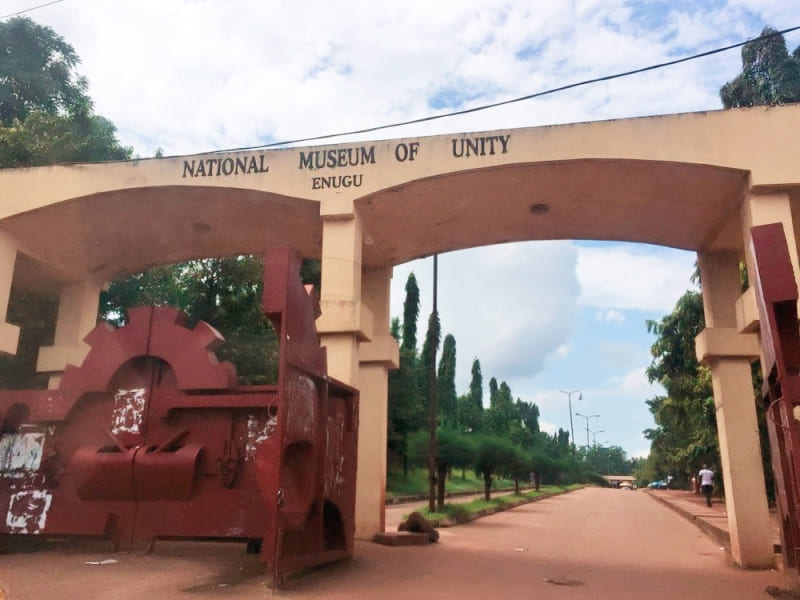
Interactive displays, educational programs, and rotating exhibitions make the National Museum of Unity not just a place to view objects, but a space for engagement and dialogue. The museum presents a unique opportunity to delve into the complexities of Nigerian heritage, unravel the country’s colonial past, and celebrate the achievements and contributions of its people. Whether you’re a tourist or a local, the museum offers an enriching experience that invites you to explore the untold stories and unsung heroes of Nigeria.
Address:
National Museum of Unity, Alesinloye GRA, Ibadan, Oyo State, Nigeria.
Calabar Museum
Calabar Museum offers a fascinating glimpse into both the pre-colonial and colonial history of Nigeria. Located in a former British consular residence, the building itself is a piece of history, constructed in the colonial architectural style with sweeping verandas and high ceilings. The museum showcases a diverse range of exhibits that include indigenous artifacts, colonial memorabilia, and thematic displays that explore various periods of Nigerian history, including the trans-Atlantic slave trade. Interactive exhibits and well-curated displays make it a vital destination for anyone looking to understand the complex narrative of Calabar and Nigeria as a whole.
Beyond the artifacts, the Calabar Museum serves as a vital educational platform. Frequent lectures, workshops, and special exhibitions engage the community and tourists alike, making it not just a place to observe history but to actively engage with it. Whether you’re interested in anthropology, history, or the arts, the Calabar Museum offers a unique lens through which to explore the cultural richness and historical complexities of this captivating region.
Address: Calabar Museum, Marina Resort, Calabar, Cross River State, Nigeria
Arewa House Museum, Kaduna
The Arewa House Museum is located in the heart of Kaduna, serving as a priceless reservoir of Northern Nigerian history, culture, and political development. Originally the residence of Sir Ahmadu Bello, the Sardauna of Sokoto and the first Premier of Northern Nigeria, the museum now stands as a testament to his vision for unified and progressive Northern Nigeria. The museum’s collection ranges from photographs, personal items, and historical documents to artwork and cultural artifacts, all meticulously preserved to educate future generations on the heritage and achievements of Northern Nigeria.
The museum also functions as a research center, attracting scholars and historians from around the globe. Its library boasts a comprehensive collection of manuscripts, newspapers, and other publications that offer deep insights into not only the Arewa region but also the broader political and cultural narratives of Nigeria. Whether you are a researcher, a history enthusiast, or a tourist interested in understanding the depth of Nigerian culture, Arewa House Museum offers an unparalleled glimpse into the soul of Northern Nigeria.
Address: Yakubu Avenue, Kaduna, Nigeria
Owo Museum
Located in Owo, Ondo State, the Owo Museum is a remarkable institution that serves as a treasure trove of Yoruba culture and history. The museum houses an extensive collection of artifacts, sculptures, and traditional regalia, offering visitors an in-depth look at the lives, beliefs, and artistic expressions of the Yoruba people. From intricately carved ivory to captivating terracotta sculptures, the Owo Museum offers an immersive experience, showcasing the craftsmanship and cultural richness that have long been part of the Yoruba heritage.
Founded to preserve and celebrate the culture of the Yoruba, one of Nigeria’s major ethnic groups, the Owo Museum stands as an educational beacon for both locals and tourists. The museum provides not only historical context but also serves as a platform for cultural education. Guided tours and educational programs are often available, making the museum a must-visit for anyone interested in delving into the cultural tapestry of Nigeria.
Address: Owo, Ondo State, Nigeria
